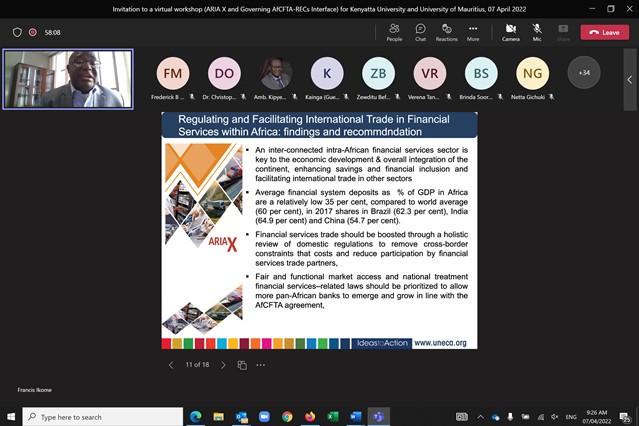
April 07, 2022: The Economic Commission for Africa (ECA) and COMESA hosted a virtual workshop with students, staff of two universities that have rolled out the COMESA Masters Programme in Regional Integration to disseminate two ECA reports namely: “Assessing Regional Integration in Africa (ARIA X) focusing on the theme of Services Trade Liberalization and integration within the AfCFTA” and “Governing the interface between the African Continental Free Trade Area (AfCFTA) and Regional Economic Communities (RECs)”
The reports cover pertinent issues of regional integration and falls within the framework of ECA’s policy strategy of translating ideas and findings (embodied in its knowledge products) to action.
The Kenyatta University in Kenya and the University of Mauritius, are the two universities that are most advanced in rolling out the COMESA MA Programme on Regional integration, having already enrolled students. This is a postgraduate virtual programme carried out through a collaboration involving 22 universities in COMESA region.
The half-day workshop was aimed at showcasing and discussing the key findings and recommendations of the two reports with the key stakeholders of the COMESA’ strategic Masters programme on Regional Integration with a view of facilitating uptake and implementation.
The first report highlights the growing importance of the Services Sector on the continent amidst the challenges that the sector continues to face even as services trade constitute one of the protocols of the AfCFTA Agreement. The second highlights the progress and the challenges regional economic communities have faced in trying to promote trade integration among their member States.
The analyses provided by the reports have the potential to contribute to deepening understanding of various nuances in Africa’s regional integration efforts, including concrete policy interventions that could increase the prospects of successfully implementing the Africa Continental Free Trade Area and regional economic communities level, Free Trade Area, as well as improving Africa’s overall integration environment.
The workshop provided a engagement platform with students enrolled in this strategic programme, most of whom are already practitioners or alternatively, are prospective practitioners in various government departments, regional integration organizations and private sector institutions dealing with diverse issues of integration.
The workshop is also expected to pitch the reports as dependable resource materials for the research efforts that the students of the COMESA MA Programme on Regional Integration would be engaging in.





